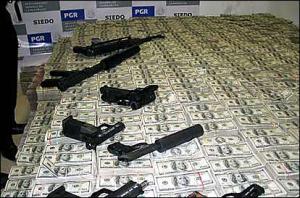by Bernd Debusmann Jr.
Mexican drug trafficking organizations make billions each year smuggling drugs into the United States, profiting enormously from the prohibitionist drug policies of the US government. Since Mexican president Felipe Calderon took office in December 2006 and called the armed forces into the fight against the so-called cartels, prohibition-related violence has killed more than 45,000 people, including more than 15,000 last year and approximately 13,000 this year. The increasing
militarization of the drug war and the arrest or killing of dozens of high-profile drug traffickers have failed to stem the flow of drugs -- or the violence -- whatsoever. The
Merida initiative, which provides $1.4 billion over three years for the US to assist the Mexican government with training, equipment and intelligence, has so far failed to make a difference. Here are a few of the latest developments in Mexico's drug war:
Tuesday, December 13
In Chihuahua
, two bodyguards were killed during an attack on the public safety secretary of the town of Gran
Morelos. Miguel Angel Gomez
Carrera was wounded along with his wife and two children. The two bodyguards were following them in a pickup truck.
Carrera has been in the position since November 21, when his predecessor was arrested with a known drug trafficker.
In Monterrey,
eight people were murdered. In one incident, five young men were kidnapped, taken to a street corner, lined up against a wall and shot.
Thursday, December 15
In Saltillo,
Coahuila,
a series of fire fights left 10 people dead, including one soldier and one bystander. The violence began early in the afternoon when soldiers began chasing a convoy of armed men. During the gun battle, a woman was shot and suffered wounds from which she later died. One gunman was killed when his vehicle crashed. Three men were later arrested during a raid at a safe house in connection with the incident.
Later that night, seven gunmen and a soldier were killed in a fire fight.
Near
Culiacan,
two men were executed and dumped off the side of a highway. One of the men, Juan Guzman
Rocha, "El
Juancho" is reported to be a first cousin or nephew of
Sinaloa Cartel boss Joaquin "
Chapo" Guzman. He is also thought to be a member of Los
Antrax, a group of
Sinaloa Cartel enforcers.
In
Zacatecas,
armed men thought to be from the Sinaloa Cartel attacked targets in five towns, killing four people and wounded eight others. In one incident, armed men entered a hospital and threatened staff before taking away three men who were being treated there for wounds suffered earlier. Grenades were used in several of the attacks. In the town of
Jerez, a convoy of 20 vehicles -- totaling around 70 gunmen -- briefly kidnapped and beat several local police officers before releasing them.
Friday, December 16
In
Michoacan,
the dismembered bodies of two men were found on a road in the municipality of
Iguala. A note -- which was held in place by the two heads -- said that the men were executed for being kidnappers and extortionists.
Monday, December 19
In Durango, soldiers
discovered a grave site containing 10 bodies. This is the 14
th mass grave found in the state of Durango this year, totaling 287 bodies. Officials have said many of the killings are a result of an internal dispute within the
Sinaloa Cartel.
In Mexico City, the army announced that between December 1, 2006 and December 19, 2011, soldiers had been involved in a total of 1,948 violent incidents with gunmen, in which a total of 126 soldiers and 2,268 gunmen were killed -- a 1:18 ratio. A total of 2,180 gunmen were captured and 348 wounded, compared to 744 soldiers wounded.
During that timeframe, the Army received 5,962 human rights complaints, for which 92 non-binding recommendations were issued by the governmental human rights commission.
Tuesday, December 20
In Arizona,
authorities announced that some 200 alleged members of the
Sinaloa Cartel were arrested following a 15-month investigation. Approximately $7.8 million dollars were seized, as well as 650 pounds of marijuana, 435 pounds of meth, 123 pounds of coke and 4.5 pounds of heroin, as well as over 40 weapons.
In
Sinaloa,
the former mayor of the town of Cosala was shot and killed in his home. He was mayor between 2008 and 2010.
Editor's Note: We have been conservatively estimating Mexican drug war deaths this year after El Universal quit publishing a box score. As of mid-November, we had estimated 8,100 deaths so far this year, but in light of new figures have revised that figure upward by about 3,000 deaths. Even that figure is an estimate, no more, until there is some official toll reported.]
Total Body Count for 2007 (
approx.): 4,300
Total Body Count for 2008 (
approx.): 5,400
Total Body Count for 2009 (
approx.): 9,600
Total Body Count for 2010 (official): 15,273
Total Body Count for 2011 (
approx.): 12,000
TOTAL: > 45,000

Comments
Treat Marijuana Like Alcohol
Treat Marijuana Like Alcohol
Add new comment